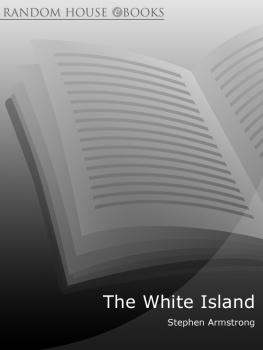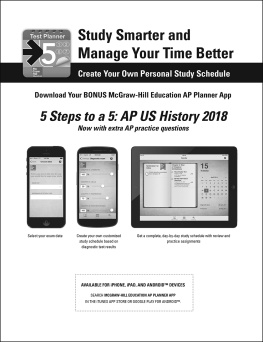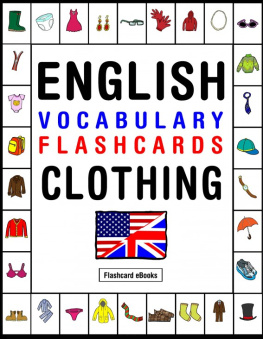5 STEPS TO A 5
AP U.S. History FLASHCARDS
Stephen Armstrong



Copyright 2011 by The McGraw-Hill Companies, Inc. All rights reserved. Except as permitted under the United States Copyright Act of 1976, no part of this publication may be reproduced or distributed in any form or by any means, or stored in a database or retrieval system, without the prior written permission of the publisher.
ISBN: 978-0-07-177579-3
MHID: 0-07-177579-X
The material in this eBook also appears in the print version of this title: ISBN: 978-0-07-176072-0, MHID: 0-07-176072-5.
eBook conversion by codeMantra
Version 2.0
All trademarks are trademarks of their respective owners. Rather than put a trademark symbol after every occurrence of a trademarked name, we use names in an editorial fashion only, and to the benefit of the trademark owner, with no intention of infringement of the trademark. Where such designations appear in this book, they have been printed with initial caps.
McGraw-Hill eBooks are available at special quantity discounts to use as premiums and sales promotions, or for use in corporate training programs. To contact a representative please e-mail us at bulksales@mcgraw-hill.com.
Trademarks: McGraw-Hill, the McGraw-Hill Publishing logo, 5 Steps to a 5, and related trade dress are trademarks or registered trademarks of The McGraw-Hill Companies and/or its affiliates in the United States and other countries and may not be used without written permission. All other trademarks are the property of their respective owners. The McGraw-Hill Companies is not associated with any product or vendor mentioned in this book.
TERMS OF USE
This is a copyrighted work and The McGraw-Hill Companies, Inc. (McGraw-Hill) and its licensors reserve all rights in and to the work. Use of this work is subject to these terms. Except as permitted under the Copyright Act of 1976 and the right to store and retrieve one copy of the work, you may not decompile, disassemble, reverse engineer, reproduce, modify, create derivative works based upon, transmit, distribute, disseminate, sell, publish or sublicense the work or any part of it without McGraw-Hills prior consent. You may use the work for your own noncommercial and personal use; any other use of the work is strictly prohibited. Your right to use the work may be terminated if you fail to comply with these terms.
THE WORK IS PROVIDED AS IS. McGRAW-HILL AND ITS LICENSORS MAKE NO GUARANTEES OR WARRANTIES AS TO THE ACCURACY, ADEQUACY OR COMPLETENESS OF OR RESULTS TO BE OBTAINED FROM USING THE WORK, INCLUDING ANY INFORMATION THAT CAN BE ACCESSED THROUGH THE WORK VIA HYPERLINK OR OTHERWISE, AND EXPRESSLY DISCLAIM ANY WARRANTY, EXPRESS OR IMPLIED, INCLUDING BUT NOT LIMITED TO IMPLIED WARRANTIES OF MERCHANTABILITY OR FITNESS FOR A PARTICULAR PURPOSE. McGraw-Hill and its licensors do not warrant or guarantee that the functions contained in the work will meet your requirements or that its operation will be uninterrupted or error free. Neither McGraw-Hill nor its licensors shall be liable to you or anyone else for any inaccuracy, error or omission, regardless of cause, in the work or for any damages resulting therefrom. McGraw-Hill has no responsibility for the content of any information accessed through the work. Under no circumstances shall McGraw-Hill and/or its licensors be liable for any indirect, incidental, special, punitive, consequential or similar damages that result from the use of or inability to use the work, even if any of them has been advised of the possibility of such damages. This limitation of liability shall apply to any claim or cause whatsoever whether such claim or cause arises in contract, tort or otherwise.
Introduction
McGraw-Hills 5 Steps to a 5: AP U.S. History Flashcards is designed to provide a portable way for you to build your knowledge of U.S. history in preparation for the AP exam. It contains 600 terms and their definitions that coincide with the chapter chronology in 5 Steps to a 5: AP U.S. History.
If you need to find the location of a term, refer to the .
TERM
Inca Empire
Inca Empire
Advanced and wealthy civilization was centered in the Andes mountain region of South America
Aided by smallpox, the Spanish conquistador Francisco Pizzaro conquered the Incas in 1533
Astrolabe
Astrolabe
Instrument that enabled navigators to calculate their latitude using the sun and stars
Allowed more accuracy in plotting routes during the Age of Discovery
Aztecs
Aztecs
Advanced Native American society located in central Mexico
Conquered in 1521 by the Spanish conquistador Hernn Cortz
Their defeat was hastened by smallpox brought to Mexico by the Spanish
Crusades
Crusades
European attempts to capture the Holy Land in the Middle Ages
Europeans acquired an appreciation of the economic benefits of overseas expansion and slavery
Hunter-Gatherers
Hunter-Gatherers
Early societies that existed not by farming but by moving from place to place and gathering food as they went
Some early Native American tribes in northern New England lived as hunter-gatherers
Huguenots
Huguenots
Protestants in France, who by the 1630s were believers in Calvinism
Few Huguenots ended up settling in the Americas, as French officials feared they would disrupt the unity of colonial settlements
Jesuits
Jesuits
Catholic missionary group that established settlements in Florida, New Mexico, Paraguay, and several areas within French territory in North America
Were organized with military precision and order
Franciscans
Franciscans
Catholic missionaries who established settlements in the late 1500s in what is now the southwestern United States
At their missions Christian conversion was encouraged, but Native Americans were used as virtual slaves
Rebellions at the missions began in 1598
Puritans
Puritans
Religious dissidents who left England for America to establish a purer church
Settled Plymouth Colony in 1620 and the Massachusetts Bay Colony in 1630
Were heavily influenced by John Calvin and his concept of predestination
Church of England
Church of England
Also called the Anglican Church
Protestant state church established by King Henry VIII
Religious radicals desired a purer church than was allowed by monarchs in the early 17th century, causing some to leave for the Americas
Calvinism
Calvinism
Protestant faith that preached salvation by faith alone and predestination
The desire of Calvinists in England to create a pure church was only partly successful, so many Calvinist Puritans went to the New World starting in 1620
Separatists
Separatists
Calvinist Protestants who did not believe that the Church of England could be purified and hence chose to separate from it










